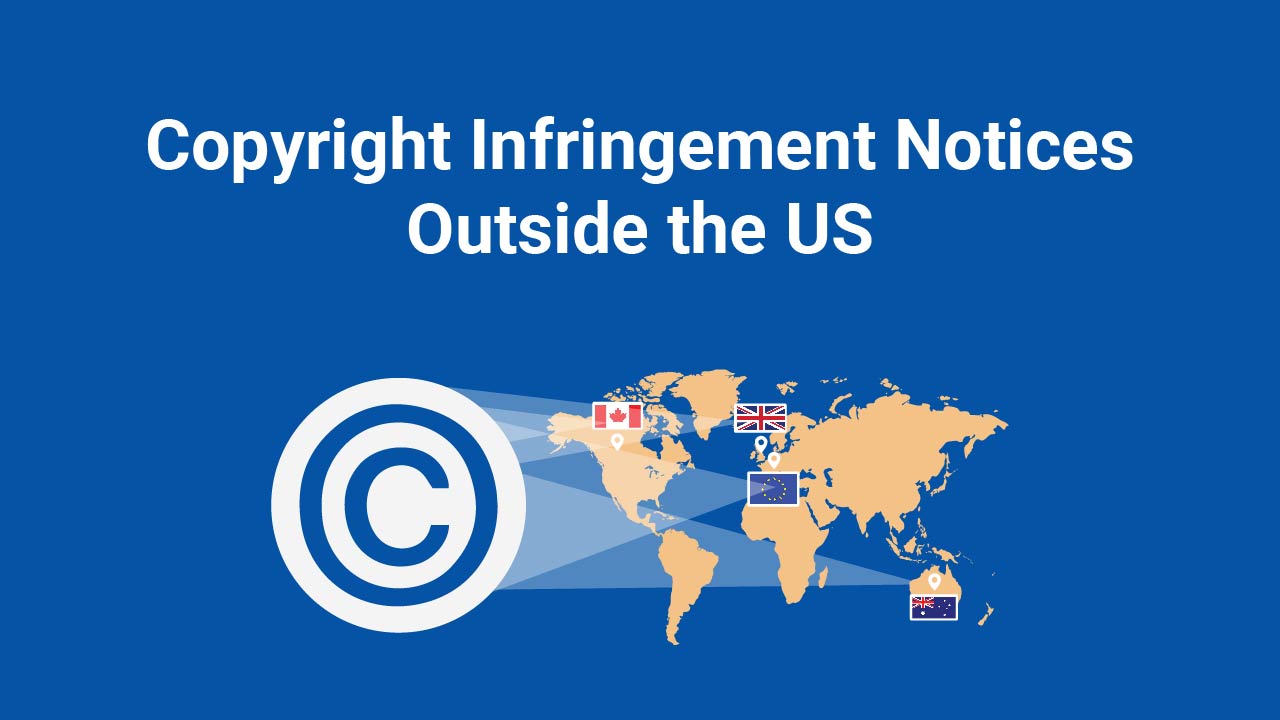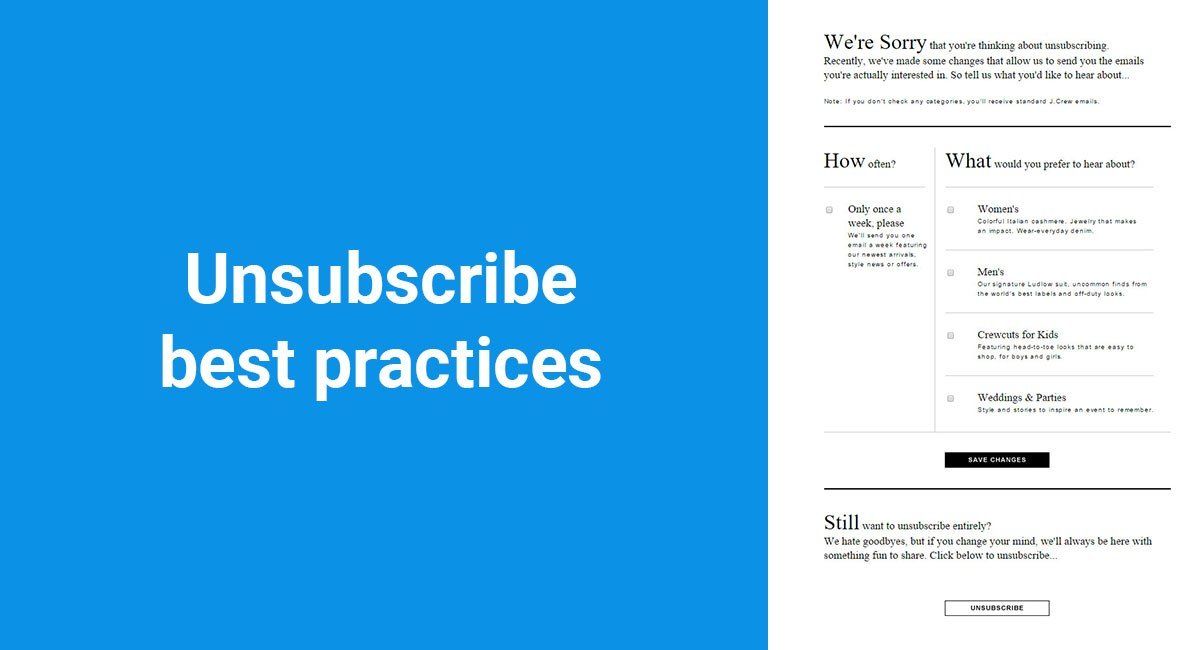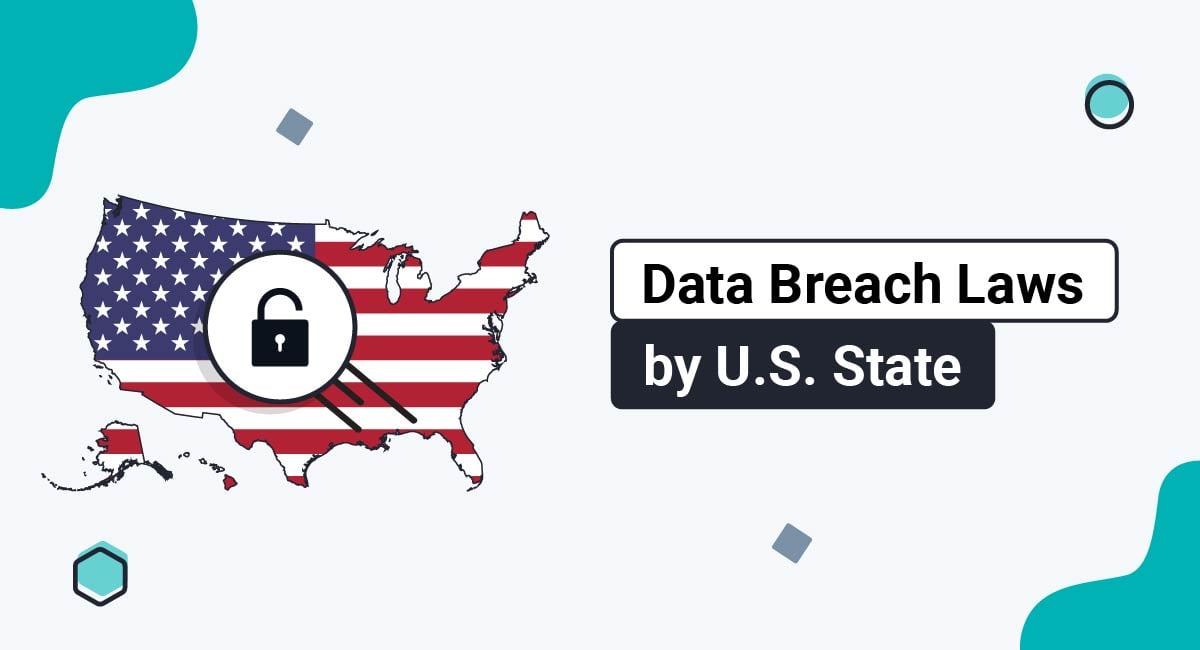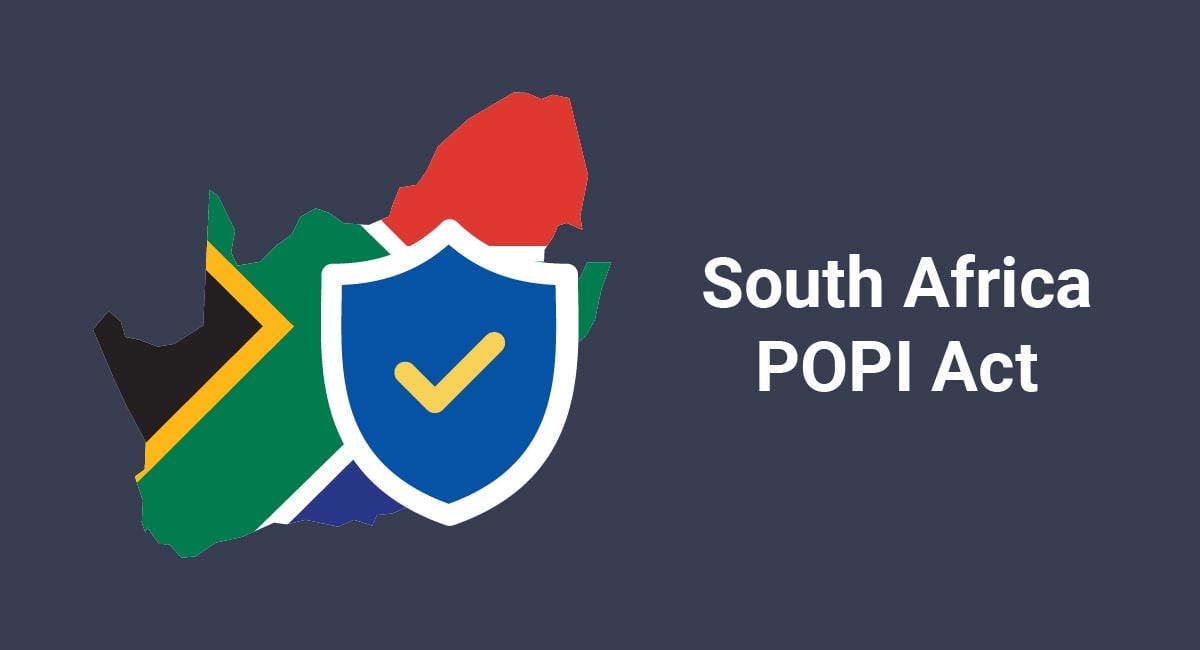You've created the perfect eBook, video, or blog post, and you can't wait to share it with the world. It's an amazing feeling.
...Until you realize that someone has infringed on the copyright on your prized creation.
Now what?
In the US, dealing with copyright infringement is pretty straightforward. But what about other countries around the world?
If someone infringes on your copyright on the web, you can electronically file a notice with the offender's internet service provider (ISP).
Thanks to the US Digital Millennium Copyright Act (DMCA), ISPs don't face any legal liability if one of their customers violates someone else's copyright, but they do have a legal obligation to remove the content if the violator refuses to.
TermsFeed is the world's leading generator of legal agreements for websites and apps. With TermsFeed, you can generate:
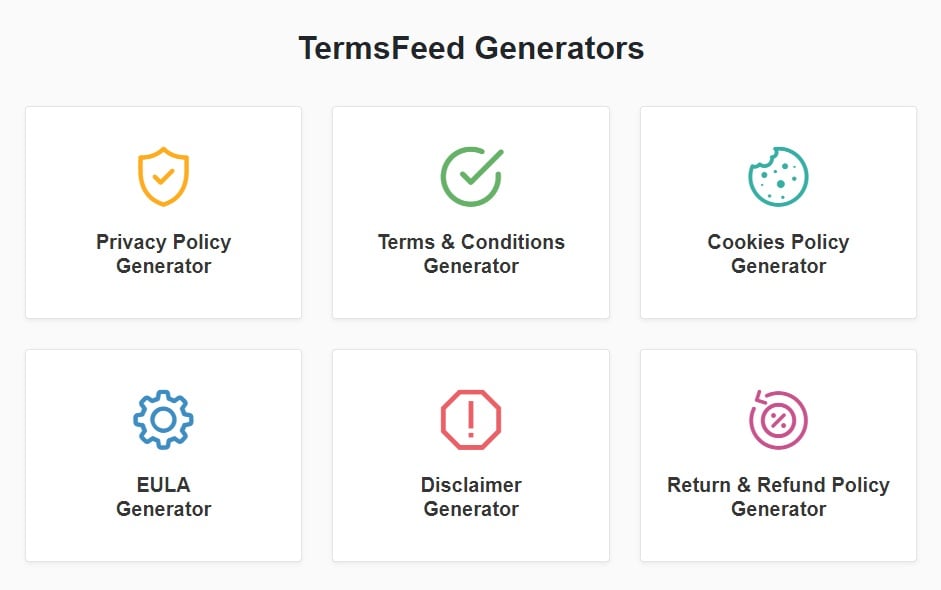
Here's an example of what the infringer will receive if you file a DMCA complaint over a YouTube video:
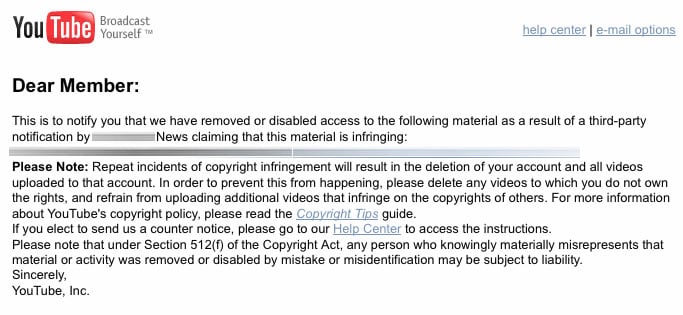
DMCA notices cover any kind of copyrighted material that could be infringed on through the internet, including:
- Written works like books and articles
- Videos
- Audio files
- Photographs and other still images
- Pictures you've posted on your social media sites
- Software
You don't need to hire a professional to file a DMCA notice. You simply have to file it in the right place - either the ISP's abuse department, or the designated DMCA agent for the ISP.
When you do, be sure to include as many details as you can, including:
- A description of your copyrighted content
- Details about the infringing content (like the website where it has been published)
- Your contact information
Because DMCA applies to every single website that's hosted in the US, if an American website infringes on your copyright, you can file a DMCA notice with the ISP even if you don't live in the US.
What many people don't realize is that your material has copyright protection even if you don't officially register it with the US Copyright Office. However, you'll need an official registration if you want to sue the infringer in federal court.
Something else many people don't know is that your copyright - digital or otherwise - will still be protected decades after you pass away. In the US, a copyright is valid until 70 years after the holder's death.
Copyright Infringement Notices in Canada

Like the US, you automatically have copyright protection in Canada as soon as you create your work. You don't have to officially register it, although the Intellectual Property Institute of Canada recommends doing so. Either way, your copyright will exist for 50 years after your death.
Since 1921, Canadians have been bound by the provisions in the Copyright Act of Canada.
According to Section 35(1), the infringer is legally liable for turning over the money he made as a result of his infringement. The copyright owner has some options when it comes to getting that restitution.
The copyright holder can either make the infringer pay all of the money that the holder lost as a result of the infringement, or the holder can ask the court to determine a fair financial penalty from $100-$5,000 for non-commercial work and $500-$20,000 for infringing on commercial work.
If the infringer goes to far as to sell or rent the copyrighted material, he can face criminal charges, larger fines, and even up to two years in prison.
When it comes to digital copyright protection, Canada has the Notice and Notice system.
If you believe someone has violated your copyright, you notify the infringer's ISP. Then, the ISP turns around and sends the infringer a notice.
Unlike the US, though, the ISP has no legal obligation to remove the material in question. In fact, you may need to go so far as to get a court order to have your copyrighted material removed.
That is why some people call the US' DMCA protection Notice and Takedown, while Canada's is simply called Notice and Notice.
Here's an example of the notice the infringer will receive from his Canadian ISP:
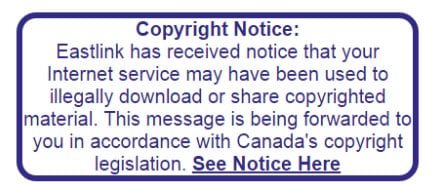
Some copyright experts believe that the copyright laws in Canada don't go far enough to dissuade infringement. The International Intellectual Property Alliance, an American organization that fights for the rights of publishers, entertainers, TV and movie producers, says that Canada has become a safe haven for piracy and illegal file sharing.
In early 2018, a group of Canada's largest communications companies went to the Canadian Radio-Television and Telecommunications Commission (CRTC) and asked them to create an Independent Piracy Review Agency to determine which websites regularly pirate content. Then, the CRTC could require all of the country's ISPs to block access to those websites. Whether the CRTC goes along with this idea remains to be seen.
Copyright Infringement Notices in the UK

UK residents must adhere to the Copyrights, Designs, and Patents Act of 1988. Today, that law is slightly different than its original version, thanks to directives from the EU and various case law that has been established. In 1995, copyright protection was extended, so now your work will be copyrighted 70 years after your death.
In the UK, your copyright can be violated in variety of ways, including:
- If someone copies any portion of your work, big or small
- If someone issues those copies to the public
- If someone rents or lends copies of your work to the public
- If someone performs or presents your work in public
- If someone electronically broadcasts your work to the public
- If someone makes any adaptations to your work
Like the US and Canada, you are not required to officially register your copyright in order to have legal protection. However, taking action against any infringers will be easier if you have proof of registration.
Either way, according to The UK Copyright Service, if you believe someone has infringed on your copyright, you should collect some basic evidence to support your claim, including:
- A copy of the infringing work, just in case the infringer tries to alter it after he receives your complaint.
- A copy of your own work. To make things easy, mark the sections where your copyright has been violated.
- If you registered your work, provide a copy of your registration certificate and a copy of the registered document (if you've edited it since it was registered).
- Any development work you may have, like rough drafts or previous versions. This will help prove that you actually created the work.
Once you have your evidence, your first step is to contact the infringer directly. Present your evidence, then demand that the infringer remove the content. Give him a deadline, and then tell him that if the deadline passes before the content is removed, you will move forward with legal action.
If the copyright violation is occurring online, you should also contact the infringer's online service provider and/or the company that provides network access to the infringer.
Unlike in Canada, online service providers in the UK can be held legally liable if they don't remove infringing content after they've been notified that one of their customers has violated a copyright.
If you do need to hire a lawyer and pursue formal legal action, there are two ways you can do it.
The first is to file a claim in small claims court. Or, you can file a claim with the Intellectual Property Enterprise Court, which was created solely to deal with patent, copyright, and trademark violations. Your lawyer can tell you which claim is best for your specific situation.
Depending on the severity of the violation, the infringer can face a fine up to £50,000 and even six months in jail.
Copyright Infringement Notices in Australia

In Australia, your work is covered by the Australian Copyright Act of 1968.
In 2007, copyright law was expanded to give performers protection against anyone who may record their performance. If you've created some kind of design, like a sculpture or a drawing, you're also protected under Australia's Design Act. And, like the other countries we've already discussed, you're not required to officially register your work in order to benefit from copyright protection.
Originally, copyright protection in Australia lasted for the creator's entire life, plus 50 years. In 2004, Australian lawmakers expanded the protection to 70 years after the creator's death.
In Australia, copyright law is broken down into two separate types of rights - economic rights and moral rights.
Like the name suggests, economic rights pertain to the the money that the copyright holder can make by selling and/or licensing his copyrighted material. However, moral rights cannot be transferred to anyone else. That's because moral rights have to do with the creator himself.
These rights require that he be attributed anytime his work is cited, that no one else can claim to have created the material, and that the creator's work cannot be treated in a derogatory manner.
In Australia, only material work can be protected. Ideas cannot be copyrighted. So, if you predicted that the winning lottery numbers would include the number 14, you can't claim a copyright violation if someone else made the same prediction an hour later.
However, if you wrote an article explaining why you thought the number 14 would be included, the article would have copyright protection.
If you suspect that your copyright has been violated, you first need to consider whether or not the infringement is simply a case of Fair Dealing.
In these instances, you will not be able to make a copyright violation claim:
- If your work is being reviewed or criticized
- If your work is being studied or used as research
- If your work is being reported on by the news
- If your work is being used in judicial proceedings or as professional legal advice
- If your work is being parodied or used for satire
How does the copyright infringement notification process work in Australia?
Like the US and the UK, you can file a complaint with the infringer's ISP. In Australia, ISP's are required to notify their customers anytime they are accused of copyright infringement. You must begin the process this way, because if you ever wind up going to court over the matter, the court is going to want proof that you tried to solve the problem before filing suit.
You can also send a letter of demand to the alleged infringer. The letter of demand for breach of copyright should:
- Make the infringer aware that you're the creator and copyright owner of the work
- Spell out your rights as the copyright owner
- Explain how what the recipient has done has infringed upon these rights
- Suggest what you'd like to have done to remedy the situation
- Let recipient know that if you don't receive an adequate response by a specified deadline you have the right to begin legal proceedings
Serve the document formally as evidence for any court proceedings you may need to initiate.
What you say in your original complaint is up to you. You can simply demand that the infringing material be removed. Or, you can demand payment for any money the infringer made from your copyrighted material.
If you'd like to make ongoing money from this infringer, you can offer him a licensing deal, which means he would pay you in exchange for being able to legally use the material.
If you do wind up in a courtroom, the infringer faces steep penalties. The court can impose a fine of up to $60,000 for individuals and $300,000 for corporations. However, these maximums are hardly ever handed down because they're reserved for the most serious and damaging cases of infringement.
Copyright Infringement Notices in the EU

While the individual countries in the EU can establish their own copyright laws - like the UK has - these countries are also bound to follow directives and regulations handed down from the Court of Justice of the EU.
There are 11 directives and two regulations, but here's what kind of copyright protection you can enjoy:
- The exclusive right to decide if you want to sell your copyrighted material, how much you want to sell it for, and how many of your copyrighted items you want to sell
- The right to choose whether your copyrighted material can be rented or borrowed
- The right to decide whether your material can be broadcast via satellite or cable
- The right to decide if your online material can be used outside of the EU's borders
These rights apply to literary, artistic, and scientific material. Included in that group is software, databases, and other intellectual property.
Like the other countries we've discussed, you are not required to formally register your copyright to receive legal protection. Depending on what kind of material you have created, the copyright protection will last 50-70 years after your death. Typically, individual authors and artists have 70 years' worth of protection, while groups of producers only have 50 years after the production was last shown to the public.
In 2016, the Court of Justice of the EU ruled that websites that link to infringing material can also face legal repercussions. The key, though, is whether or not the website owner knew or should have known that he was linking to infringing material.
Like the other countries, if your digital copyright is being violated, you can file notice with the infringer's ISP. As long as the online host didn't know the copyright infringement was happening, it can't be held legally liable for it. Once the host is notified, however, it has a duty to remove the infringing material.
Here's a useful FAQ on EU copyright that provides more insight into specific scenarios and issues.
Throughout the world, copyrights offer some serious protection. Now that you know what your rights are -- and how to assert them in countries all over the world -- you have everything you need to protect your valuable work.

Comprehensive compliance starts with a Privacy Policy.
Comply with the law with our agreements, policies, and consent banners. Everything is included.
